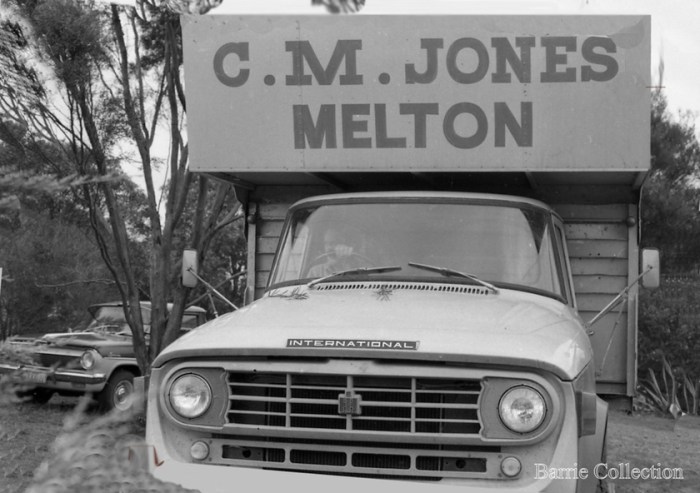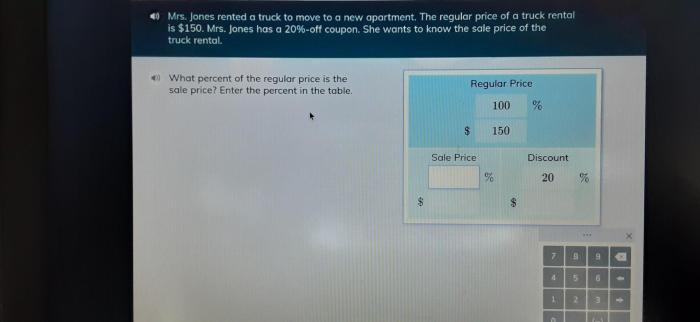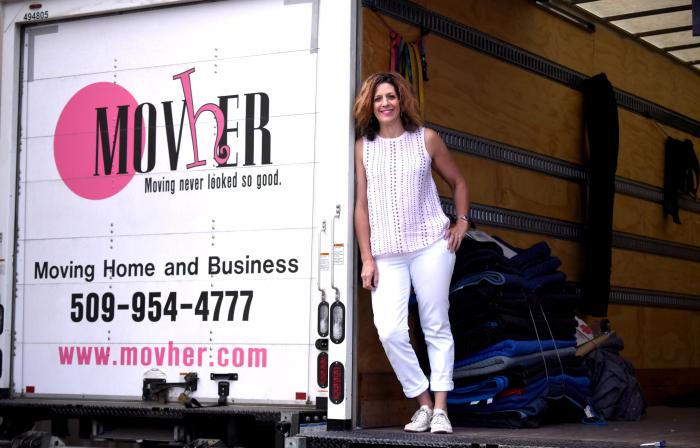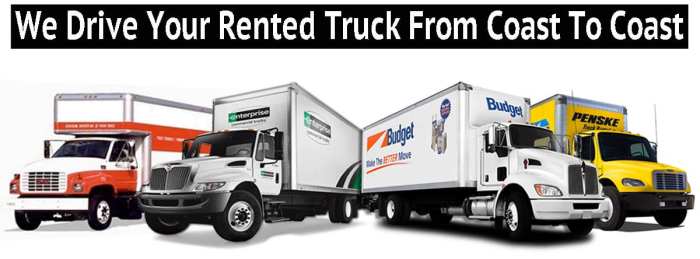Mrs jones rented a truck – Mrs. Jones rented a truck, and so can you! This guide will provide you with everything you need to know about renting a truck, from the different types of trucks available to the insurance coverage you’ll need. Whether you’re moving across town or across the country, we’ve got you covered.
In this comprehensive guide, we’ll cover everything you need to know about renting a truck, including the different types of trucks available, the rental process, insurance coverage, loading and unloading, driving safety, returning the truck, cost considerations, and customer service.
So whether you’re a first-time renter or a seasoned pro, we’ve got you covered.
Renting Procedures

Renting a truck is a convenient and cost-effective way to transport large items or move belongings. The process of renting a truck is generally straightforward, but it is important to be aware of the steps involved and the documentation required.
Here is a step-by-step guide to renting a truck:
Choosing a Truck
The first step is to choose the right truck for your needs. Consider the size of the items you are transporting, the distance you will be traveling, and the terrain you will be driving on.
- Small trucks:Suitable for moving small items or short distances.
- Medium trucks:Ideal for moving larger items or longer distances.
- Large trucks:Designed for transporting large or heavy items, such as furniture or appliances.
Documentation and Requirements
To rent a truck, you will typically need to provide the following documentation:
- Valid driver’s license
- Proof of insurance
- Credit card or debit card
- Proof of residency(e.g., utility bill or bank statement)
Some rental companies may also require a deposit or a security hold on your credit card.
Renting the Truck
Once you have chosen a truck and provided the necessary documentation, you can rent the truck by completing the rental agreement.
The rental agreement will typically include the following information:
- The rental period
- The rental rate
- The mileage limit
- The insurance coverage
- The terms and conditions of the rental
It is important to read and understand the rental agreement before signing it.
Returning the Truck
When you are finished with the truck, you will need to return it to the rental company.
Before returning the truck, be sure to:
- Clean out the truck
- Refuel the truck
- Check the mileage
Upon returning the truck, you will need to complete a return form and pay any outstanding fees.
Rental Agreement

A truck rental agreement is a legal contract between the renter and the rental company that Artikels the terms and conditions of the rental. It is important to read and understand the agreement carefully before signing it, as it will bind you to the terms of the rental.
The agreement will typically include the following information:
- The type of truck being rented
- The rental period
- The rental rate
- The deposit required
- The insurance coverage
- The responsibilities of the renter
- The responsibilities of the rental company
- Any additional fees or charges that may apply
Responsibilities of the Renter
The renter is responsible for the following:
- Using the truck only for the purposes specified in the agreement
- Operating the truck safely and in accordance with all applicable laws
- Maintaining the truck in good condition
- Returning the truck on time and in the same condition as it was received
- Paying all rental fees and charges
Responsibilities of the Rental Company
The rental company is responsible for the following:
- Providing the renter with a safe and well-maintained truck
- Honoring the terms of the agreement
- Refunding the renter’s deposit if the truck is returned on time and in good condition
Additional Fees or Charges
In addition to the rental rate, there may be additional fees or charges that apply, such as:
- Mileage charges
- Fuel charges
- Insurance charges
- Late fees
- Cleaning fees
It is important to be aware of all of the fees and charges that may apply before renting a truck.
Insurance Coverage
When renting a truck, it’s crucial to consider the insurance options available to protect yourself and your belongings. Understanding the different types of coverage and their benefits will help you make an informed decision.
Adequate insurance coverage provides peace of mind and financial protection in case of accidents, theft, or damage to the truck or its contents. It’s essential to assess your needs and choose a coverage that aligns with your risk tolerance and budget.
Liability Coverage
Liability coverage is essential as it protects you financially if you cause an accident while driving the rental truck. It covers damages to other vehicles, property, and injuries to third parties.
Collision and Comprehensive Coverage
Collision coverage protects you if the rental truck is damaged or destroyed in an accident. Comprehensive coverage provides additional protection against theft, vandalism, and other non-collision-related events.
Personal Belongings Coverage
Personal belongings coverage protects your belongings inside the rental truck in case of theft or damage. It’s important to note that this coverage typically has a limit, so it’s wise to consider additional insurance if you have valuable items.
Loading and Unloading
Loading and unloading a truck safely and efficiently requires proper planning and execution. Follow these tips and best practices to ensure a smooth and hazard-free process.
Before loading, inspect the truck’s bed for any damage or obstructions. Secure the cargo with straps, ropes, or bungee cords to prevent shifting during transit. Distribute the weight evenly to maintain stability.
Mrs. Jones was exhausted after a long day of moving. She had rented a truck to transport her belongings, and the drive had been long and tiring. To relax and unwind, she decided to take a break and read an inspiring speech by Dr.
Martin Luther King Jr. on CommonLit . The words of hope and determination filled her with a renewed sense of purpose, and she felt ready to tackle the rest of her move with a smile.
Equipment and Techniques
Use ramps or a loading dock to ease the movement of heavy items. Utilize a hand truck or dolly for smaller loads. For bulky items, consider using a forklift or crane.
When lifting heavy objects, maintain a straight back and lift with your legs. Avoid twisting or bending while carrying loads.
Potential Hazards, Mrs jones rented a truck
Be aware of potential hazards such as slippery surfaces, uneven ground, and overhead obstructions. Wear appropriate safety gear, including gloves, safety glasses, and non-slip footwear.
Ensure the truck is parked on a level surface and engage the parking brake before loading or unloading.
Driving Safety

Driving a rental truck requires additional caution and attention compared to driving a car. Here are some essential safety guidelines to follow:
Key Differences between Driving a Truck and a Car:
- Larger Size and Weight:Trucks are significantly larger and heavier than cars, which affects their handling, braking, and maneuverability.
- Higher Center of Gravity:Trucks have a higher center of gravity, making them more susceptible to rollovers in sharp turns or sudden maneuvers.
- Limited Visibility:Trucks have larger blind spots and restricted rear visibility due to their size and design.
Blind Spots and Safety Considerations:
Trucks have extensive blind spots on all sides, including:
- Front Blind Spot:Directly in front of the truck, extending several feet.
- Side Blind Spots:Large areas on both sides of the truck, especially near the rear.
- Rear Blind Spot:A large area directly behind the truck, making it difficult to see pedestrians or other vehicles.
To compensate for these blind spots, drivers must be extra vigilant when changing lanes, merging, or backing up. Use mirrors extensively, check blind spots before making any maneuvers, and proceed cautiously in areas with limited visibility.
Other Safety Considerations:
- Proper Loading:Ensure the load is evenly distributed and securely fastened to prevent shifting during transit.
- Speed Limit:Adhere to the posted speed limits and drive at a safe speed appropriate for the truck’s size and weight.
- Defensive Driving:Anticipate potential hazards and drive defensively, allowing ample time for braking and reactions.
By following these safety guidelines, drivers can minimize risks and ensure a safe and successful rental truck experience.
Returning the Truck

Returning a rental truck properly is crucial to avoid any additional charges or inconvenience. Here’s a comprehensive guide to help you with the process.
Inspection Process
Upon returning the truck, a thorough inspection will be conducted by the rental company representative. They will check for any damages, missing items, or excessive wear and tear. It’s essential to be present during the inspection to clarify any concerns or disputes.
Potential Charges for Damages
If any damages are found during the inspection, you may be responsible for the repair costs. These charges can vary depending on the severity of the damage and the rental company’s policies. It’s advisable to inspect the truck thoroughly before returning it to identify any potential issues.
Importance of Returning the Truck on Time
Returning the truck on time is essential to avoid late fees. Most rental companies charge additional fees for each hour or day the truck is overdue. It’s important to plan your return trip accordingly to avoid any unnecessary expenses.
Cost Considerations

Renting a truck involves various costs that can impact your overall budget. Understanding these costs and factors that influence them will help you make informed decisions and avoid unexpected expenses.
The primary cost components of truck rental include the base rental fee, mileage fees, and fuel costs. Additional charges may apply depending on the rental company and specific services requested.
Rental Costs
| Truck Size | Rental Period | Rental Cost |
|---|---|---|
| Small (12-14 feet) | 1 day | $50-$75 |
| Medium (16-18 feet) | 1 week | $250-$350 |
| Large (20-24 feet) | 1 month | $600-$800 |
Additional Charges
- Mileage Fees:Some rental companies charge an additional fee per mile driven. The cost varies depending on the company and the distance traveled.
- Fuel Costs:You are responsible for the fuel used during the rental period. Refuel the truck before returning it to avoid additional charges.
- Insurance:Most rental companies offer optional insurance coverage to protect against damages or accidents. The cost of insurance varies depending on the coverage selected.
- Additional Equipment:If you need special equipment, such as moving blankets or ramps, there may be additional charges.
Factors Affecting Rental Cost
- Rental Period:Longer rental periods typically result in lower daily rates.
- Truck Size:Larger trucks have higher rental costs due to increased fuel consumption and maintenance expenses.
- Rental Company:Different rental companies have varying pricing policies. Compare quotes from multiple companies to find the best deal.
- Seasonality:Demand for rental trucks fluctuates throughout the year. Rental costs may be higher during peak moving seasons.
- Location:Rental costs can vary depending on the location of the rental company and the availability of trucks.
Customer Service
Exceptional customer service is the backbone of a seamless truck rental experience. It encompasses all interactions between the rental company and its customers, from the initial inquiry to the final return of the vehicle.
Clear Communication and Responsiveness
Clear and timely communication is crucial for fostering customer satisfaction. Rental companies should provide comprehensive information about their services, rental policies, and vehicle availability. They should also be responsive to customer inquiries, whether via phone, email, or live chat.
Examples of Excellent Customer Service Practices
- Proactively contacting customers to confirm reservations and provide updates.
- Offering a dedicated customer service hotline for assistance and troubleshooting.
- Providing detailed documentation and instructions to ensure customers understand the rental process.
- Going the extra mile to accommodate customer requests, such as arranging for additional equipment or extending rental periods.
- Regularly seeking customer feedback to improve services and identify areas for improvement.
Commonly Asked Questions: Mrs Jones Rented A Truck
How much does it cost to rent a truck?
The cost of renting a truck varies depending on the size of the truck, the rental period, and the company you rent from. However, you can expect to pay between $20 and $100 per day for a small truck, and between $50 and $200 per day for a large truck.
What are the requirements for renting a truck?
To rent a truck, you will need to be at least 21 years old and have a valid driver’s license. You may also need to provide proof of insurance.
What is the best way to load and unload a truck?
The best way to load and unload a truck is to use a ramp or lift. If you are loading heavy items, you may want to use a dolly or hand truck.
What are the safety considerations for driving a truck?
When driving a truck, it is important to be aware of the vehicle’s blind spots and to drive defensively. You should also be aware of the truck’s height and weight, and to adjust your driving accordingly.